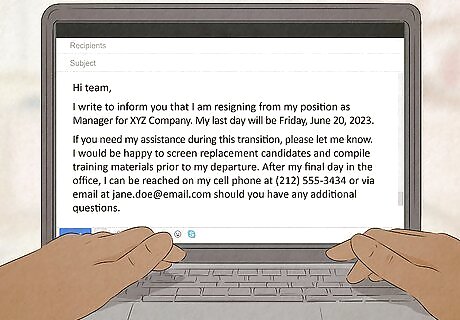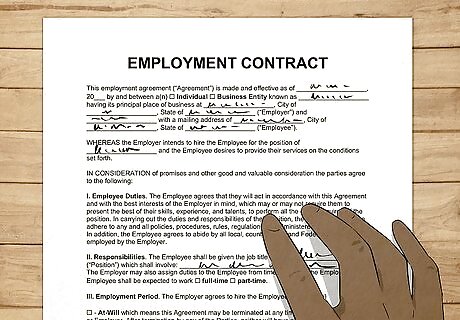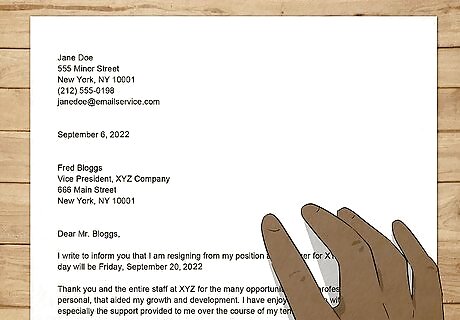
views
Walking Away

Remember you don’t need permission to quit. Legally, even if you are on contract, your employer cannot force you to stay. You are a free person and you can make the choice to leave.

Don’t worry about getting a reference. If your boss refuses to let you leave, you may have to assume that the bridge between you is already burned. There may be no way for you to walk away from this with a good reference, but that is not a good reason to stay. Your skills and experience will come with you, even if a good reference does not. There are laws that govern what a former employer can disclose to a future one. These laws vary by state.

Take this behavior as a message. The way your boss is acting should solidify the fact that it’s time to quit. In a good working relationship, an employer would not use guilt, coercion, or simple refusal to listen. This must not be a positive work relationship, so let it go.

Let your important contacts know. Before you actually walk out the door, it is a good idea to let your clients and other work contacts know. It may not be possible (or even ethical) for you take clients with you, but it is courteous to give them a heads up. Again, this will help you preserve your reputation, no matter what your boss says about you later.

Just go. If all else fails, just walk right out the door. You are free to leave already! Even providing two-weeks notice is really just a courtesy. Pick up your things, and move on with your life.
Resigning Properly

Resign in person. If your first attempt at resignation was an email or fax, be sure to actually resign in person. A letter of resignation should merely be a form of documentation (though this is very important), but your message should come directly from you. Your boss is less likely to refuse you to your face.

Make sure you’re not bound by a contract. If your boss has not accepted your resignation, double-check that you are not violating a contract of employment. If you are, begin taking steps to get out of it. If you are not contractually bound, you can move forward with making your resignation stick.

Follow a script. Before you confront your employer, practice what you are going to say. This will ensure that you explain all the essential details and stay focused. You could say, “I have decided it is time for something new. My last day here will be November 1. I know you may have a hard time understanding, but my decision is final.” If your employer pushes back you can re-state that final line: “My decision is final.”

Review your handbook. Review any employee documents (like a handbook or contract) to learn how to resign in the appropriate way. Some companies actually want employees to resign and leave the same day. Other companies want employees to provide significant notice. Some companies require written documentation of resignation, submitted through specific channels.

Follow proper protocol. Now that you know the company’s protocol, systematically follow it. Be sure you are following the guidelines exactly, as it will be one less snag your boss can hold against you.
Documenting Your Attempts to Quit

Fax and email your resignation. If your boss is failing to accept your resignation, you need to start a paper trail. After you have spoken to him or her in person, be sure your letter of resignation is delivered in other ways. Fax and/or email your letter of resignation. When emailing, it is important that you send your letter as a .PDF attachment because it ensures that your letter will not be tampered with. It is likewise important that you send the email from a personal account, in case they limit your access to your work email account. Be sure to record the date and keep a record of all communications.

Send a registered letter. The most secure method of written communication is a registered letter. This will emphasize that you are serious, as well as create an even more legitimate form of evidence. Visit your local post office to send your resignation as a registered letter. Be sure to ask for signature confirmation. Once again, keep a record of this.

Compile your documentation. Once you have contacted your employer using at least two methods, create a file of these actions. Record dates, times, and methods. Include a copy of your letter and a basic transcript of what was said when you spoke in person.

Be public. Once you’ve made your resignation official, be open about your desire to leave. Explain your reasons to those you work with, without bad-mouthing the company. By being open to the people in your office, you can sidestep rumors and help preserve your reputation, but more importantly, you can generate more truth and legitimacy for your claims of resignation.

Seek advice from a legal professional. If you are worried that your boss may harm your reputation and make trouble with your future employers, it may be a good idea to seek some legal advice. Hang on to your file of documentation and bring it with you when you speak to a lawyer.




















Comments
0 comment